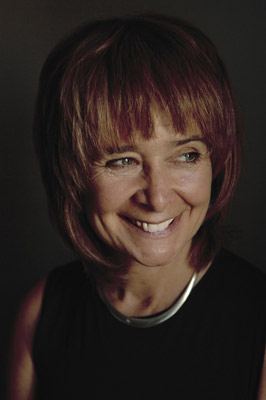Sacred Hearts Makes Renaissance Convent Life Live
Historical Novel's Author to Discuss Fact of Her Fiction
Let’s put a couple dozen people under one beautiful Italian roof, force them to eat and work together, and disconnect them from the outside world. Oh, and let’s deprive them of sleep, a heater, and electricity in a cold winter. And just for kicks, let’s make it all ladies. Let the scandal, secrets, and gossip begin!
This is not the recipe for CBS’s latest reality TV show about convent life-Big Sister, perhaps? These are the circumstances under which Renaissance Italy’s noblewomen found themselves and unlike today’s money-driven Flavor of Love crazies, not all went willingly.

New York Times best-selling author Sarah Dunant (The Birth of Venus) gives voice to these women in her latest novel, Sacred Hearts. The novel follows the new girl, 16-year-old songbird Serafina, whose family forces her to become a nun after she rejects a respectable suitor in favor of an unrespectable (but oh-so-romantic) one. A colorful cast of surprisingly savvy characters, including a kind dispensary mistress, help her find her way within the Benedictine convent’s confines. Will she ultimately marry Christ or escape imprisonment and marry her beloved music teacher?
Dunant’s novel begins with the briefest of introductions: “:Historians estimate that in the great towns and city-states of Italy, up to half of all noblewomen became nuns. Not all of them went willingly:This story takes place in the northern Italian city of Ferrara in 1570, in the convent of Santa Caterina.”
This sets up an interesting dichotomy, because while the facts and city are real, the convent is not. “The research on these novels has been very deliberately extremely accurate. The characters are made up but all of the details and color and facts are absolutely truthful to history,” explained Dunant. The author spent a year and a half doing research, including spending 10 days living in a convent just South of Milan, soaking up the beauty of its 14th century chapel while attending services, and even cleaning the church. “I did get a sense of what it’s like to live in a peaceful and sometimes silent rhythm of life,” said Dunant.

Dunant’s ability to convey the rhythm of life in such a specific, foreign time and place is quite lovely. Her quiet, intricately detailed writing makes 16th century convent life absolutely vivid by revealing every layer of carefully-chosen words, unspoken longings, and political checkmates. Thanks to literature’s magical ability to convey a truth without being entirely truthful, we feel Serafina’s agony at being locked up and ripped apart from her beloved. She was not based on one historical figure, but on hundreds.
For an average reader, that the specifics and names are fictional does not matter because the story feels true. Professors at UC Santa Barbara may argue otherwise in a panel discussion being sponsored by the University’s Religious Studies department next week.
Dunant will be at UCSB next Wednesday, October 28, giving a presentation on Sacred Hearts titled “Fact or Fiction: Women, the Vatican, and Religion.” Her lecture will precede the panel discussion, featuring professors from the Religious Studies department, as well as the English, History, and French & Italian Departments.
“We’ll discuss who can bring history alive, and what the ethics of making things up are,” said Dunant. “As a novelist, I take a lot of liberties to bring history alive. But I was trained as a historian, so I have quite a lot of respect for history.”
Her novels are “not like Dan Brown’s novels, where most of the history is made up,” said Professor Ann Taves, who is UCSB’s Virgil Cordano, OFM, chair in Catholic Studies. Taves, who will be chairing next week’s discussion, added, “She really cares about the history that informs her novels.”
Dunant believes her novel can be a painless way to learn about history without realizing you’re doing so. “Nobody picks up Sacred Hearts because they want to learn about the history of the Renaissance. They pick it up because they want to be completely intoxicated by a story,” said Dunant. “If you read this book, I promise you will at no point feel like you’re reading a history text. But because all of the little details are true, by the end of it you’ll discover you’ve learned a lot without being taught.”
4•1•1
“Fact or Fiction” will take place on Oct. 28, 4 p.m., in the McCune Conference Room 6020 in the Humanities and Social Sciences Building at UCSB.



